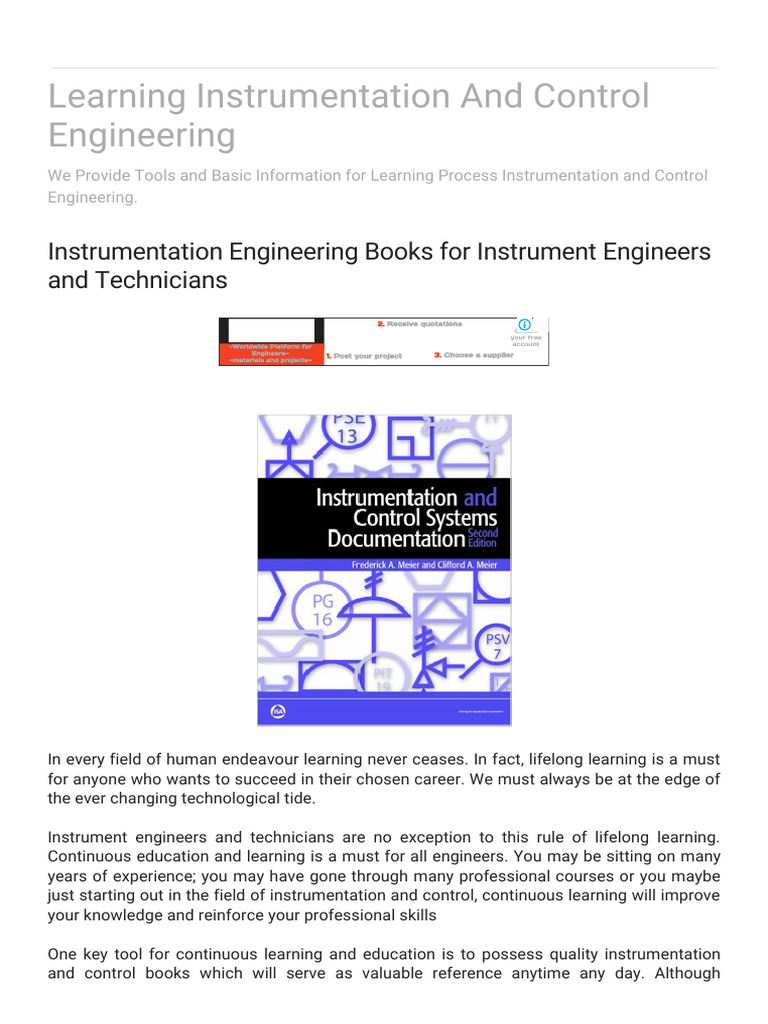Instrumentation is a field that integrates engineering principles, physics, and technology to develop tools and systems that measure, monitor, and control processes. The intricacies of this discipline demand a thorough understanding, underscoring the importance of well-chosen literature for both students and seasoned engineers alike. Among the plethora of resources available, determining which book stands as the paragon of instrumentation literature can be quite a challenge. Several criteria, ranging from comprehensiveness to specificity, ought to be evaluated when selecting the best book for instrumentation. This discussion endeavors to explore pivotal texts, illuminating factors that render them outstanding choices.
To commence, one must recognize the multifaceted nature of instrumentation, which encompasses various domains such as mechanical, electrical, and chemical engineering. As such, the ideal book for instrumentation should cater to a broad audience while simultaneously offering detailed coverage in specialized topics. One notable text that embodies these characteristics is “Instrumentation Engineering: A Comprehensive Guide.” This book excels in providing a panoramic overview of the field, seamlessly integrating theoretical concepts with practical applications. Chapters dedicated to sensors, transducers, and control systems illustrate complex mechanisms in an accessible manner, making it an indispensable resource for both novices and experts.
Moreover, the inclusion of empirical data and case studies in “Instrumentation Engineering: A Comprehensive Guide” enables readers to appreciate the real-world implications of theoretical knowledge. Such illustrations do not merely embellish the text; they create a nuanced narrative that fosters a deeper understanding of core concepts. Readers can grasp how instrumentation impacts industries, from manufacturing to healthcare, thereby kindling a genuine interest in the subject matter. This confluence of theory and application is paramount for any scholarly work.
Another eminent contender for the title of the best instrumentation book is “Process Control and Instrumentation Technology.” This text dives deep into the intricacies of process control, emphasizing the critical role that instrumentation plays in system stability and efficiency. The author meticulously delineates advanced algorithms and control strategies that are pivotal in today’s automated environments. Of particular note is the book’s detailed exploration of feedback mechanisms and the implementation of control systems in various contexts—from chemical plants to aerospace applications. The author’s methodical approach, backed by extensive research and industry experience, imbues the content with a profound level of authenticity.
An underlying reason for the allure of this title lies in its ability to transcend mere technical instruction. It invites readers into a dialogue about the ethical and environmental implications of instrumentation, forging connections between engineering practices and societal outcomes. By fostering critical thinking about technology’s role in shaping our world, it provides readers with a holistic understanding of instrumentation’s significance.
For those seeking a more introductory perspective, “Introduction to Instrumentation and Measurements” stands out as an exemplary reference. This book caters to undergraduates, offering foundational knowledge that is essential for future explorations in the field. Clarity in presentation is a hallmark of this text. The author employs lucid language, allowing complex topics to be digestible for novices. Visual aids, including diagrams and flowcharts, further reinforce comprehension, enabling readers to visualize concepts and applications with ease.
However, its value extends beyond mere simplicity. The author’s capacity to engage the reader through contextual anecdotes and historical developments ensures that the material remains intriguing. Readers come to understand not only how instrumentation works but also why it matters—a crucial element in sustaining interest and enthusiasm in the subject.
Furthermore, for those with a penchant for digital advancements, “Smart Sensors and Sensor Networks” serves as a modern take on traditional instrumentation texts. This book delves into the integration of smart technologies in instrumentation, exploring how innovation is redefining the landscape. The discussion on the Internet of Things (IoT) and the implications for data collection and analysis presents an engaging exploration of future trends. The author adeptly addresses how these technologies enhance the efficiency and accuracy of measurements, which dovetails beautifully with contemporary demands in various sectors.
In addition to the aforementioned texts, one must not overlook the importance of supplemental literature and resources. Academic journals and industry reports offer valuable insights into emerging trends and breakthroughs in instrumentation technology. Engaging with these materials cultivates a well-rounded perspective, allowing for the synthesis of knowledge from various sources. Such an interdisciplinary approach can enhance one’s understanding and application of instrumentation concepts.
It is vital to consider that the choice of the best book for instrumentation often hinges on the reader’s existing understanding of the discipline. While experienced engineers may prefer comprehensive guides or specialized texts, students and beginners might benefit more from introductory resources. Consequently, the selection process should be tailored to individual learning objectives and professional aspirations.
In conclusion, the best book for instrumentation is not a singular entity; rather, it is a confluence of several paramount works that span the spectrum from foundational understanding to advanced applications. The chosen texts must ignite passion, provoke thought, and serve as a reliable reference throughout one’s career. Ultimately, the pursuit of knowledge in instrumentation is not merely about mastering techniques and tools; it is about cultivating a profound appreciation for the interdependencies within society and technology. Each book, with its unique allure and insights, contributes to a greater understanding of the world of instrumentation, connecting the threads of science and engineering to the tapestry of everyday life.










